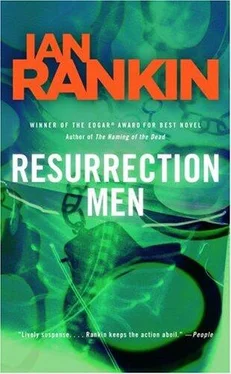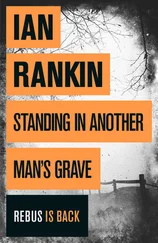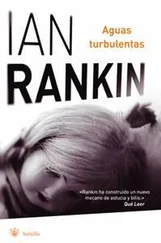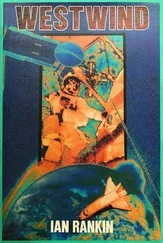“If we’re in luck, Father Joe might be there,” he’d said, referring to his snitch, Joe Daly.
“It’s not called the Zombie Bar anymore,” he explained now, leading them along Tolbooth Wynd. “That place lost its license.”
“Too many brawls?” Allan Ward guessed.
“Too many drunken poets and writers,” Hogan corrected. “The more they tart Leith up, the more people seem to come looking for the sleazy side.”
“And where’s that to be found these days?” Ward asked. Hogan offered a smile, eyes turning to Rebus.
“We’ve got a live one here, John.”
Rebus nodded. Tam Barclay wasn’t looking too lively: as the day had progressed, so had his hangover. “Mixing the beer and whiskey,” he said, rubbing at his temples. He wasn’t looking forward to their trip to the pub . . .
“What’s the Zombie called now?” Rebus asked Hogan.
“Bar Z,” came the answer. “And here it is . . .”
Bar Z had windows which were all frosted glass except for a large letter Z in the center of each. The interior was chrome and gray, the tables made from some light, trendy wood which captured and retained every beer ring and cigarette burn. The music was probably called something like “trance” or “ambient,” and a chalkboard menu offered Huevos Rancheros — listed as “a Tex-Mex all-day breakfast treat” — and Snack Attacks such as blini and baba ghanoush.
However, something had gone badly wrong with the Bar Z. The only people drinking the afternoon away were the same mixture of desperate businessmen and down-at-the-heels drunks who had probably called the Zombie Bar home. The place carried an aroma of soured dreams. Hogan pointed to one of the many empty tables and asked the trio what they wanted.
“Our round, Bobby,” Rebus insisted. “You’re the one helping us out.” Ward decided on a bottle of Holsten, while Barclay only wanted cola — “as much as you can fit in a glass.” Hogan, who said he was undecided, went up to the bar with Rebus.
“Is your man here?” Rebus asked in an undertone. Hogan shook his head.
“Doesn’t mean he won’t come in. Father Joe’s the restless type: if he goes in a place and there’s no one he knows, he moves on; never stays anywhere for more than two drinks.”
“Does he have a job?”
“He has a vocation. ” Hogan saw the look on Rebus’s face. “Don’t worry, he’s not a real priest. It’s just that he has the kind of face strangers tell their troubles to. That seems to fill Joe’s days to the brim . . .” The barman came up, and Rebus put in their order, including a half of IPA for Hogan and the same for himself.
“A game of two halves, eh?” Hogan announced with a smile.
“Aye, it’s a game all right, Bobby.”
Hogan picked up Rebus’s meaning. “So what’s reopened this particular can of worms?”
“I wish I knew.”
“Dickie Diamond was an arsehole, whole world knew it.”
“Any of his other cronies still around?”
“There’s one of them in here right now.”
Rebus looked around at the disconsolate, blank-eyed faces. “Who?”
Hogan just winked, and waited till the drinks had been paid for. When the barman slouched back with Rebus’s change, Hogan greeted him by name.
“Okay, Malky?”
The young man frowned. “Do I know you?”
Hogan shrugged. “Thing is, I know you. ” He paused. “Still on the smack?”
Rebus, too, had placed the young man as a drug user. It was something about the eyes, the facial muscles, something about the way the body held itself. In turn, the barman recognized pigs when he saw them.
“I’m off that stuff,” Malky said.
“Take your methadone religiously?” Hogan asked with a smile. “DI Rebus here is wondering whatever happened to your uncle.”
“Which one?”
“The one we don’t hear about so much these days . . . unless you know different.” Hogan turned to Rebus. “Malky here is Dickie’s sister’s kid.”
“How long you been working here then, Malky?” Rebus asked.
“Nearly a year.” The barman’s attitude had changed from indifference to surliness.
“Did you know the place when it was the Zombie?”
“I was too young, wasn’t I?”
“Doesn’t mean they wouldn’t have served you.” Rebus lit a cigarette, offering one to Hogan.
“Has Uncle Dickie turned up?” Malky asked. Rebus shook his head. “It’s just that my mum . . . every now and then she gets all weepy, says Uncle Dickie must be dead and buried somewhere.”
“What does she think happened to him?”
“How should I know?”
“You could try asking her.” Rebus had one of his cards out. It had his pager number as well as the police switchboard. “I’d be interested to know her answer.”
Malky stuck the card in the top pocket of his shirt.
“Dying of thirst over here!” Barclay called from the table. Hogan picked up two of the drinks. Rebus was staring at Malky.
“I mean it,” he said. “You ever hear anything, I’d really like to know what happened to him.”
Malky nodded, then turned away to answer the phone. But Rebus had gripped his arm. “Where do you live, Malky?”
“Sighthill. What’s it to you?” Malky wrestled his arm free, picked up the phone.
Sighthill was perfect. Rebus knew someone in Sighthill . . .
“So what happened to this place?” Ward was asking Hogan when Rebus reached the table.
“They got their market research wrong, thought there’d be enough yuppies in Leith by now to make them a fortune.”
“Maybe if they hang on a few more years,” Barclay said, pausing halfway down his cola.
Hogan nodded. “It’s coming,” he agreed. “Just a shame we didn’t get the parliament.”
Rebus snorted. “You’d’ve been welcome to it.”
“We wanted it.”
“So what was the problem?” Ward asked.
“The MSPs didn’t want to be in Leith. Too out of the way.”
“Maybe they were scared off by the temptations of the flesh,” Ward proposed. “Not that I’m seeing any around here . . .”
The door opened and another solitary drinker entered. He was all twitches and movement, as if someone had just wound up his mechanism. He saw Hogan and gave a nod of acknowledgment, but then started heading for the bar. Hogan, however, waved him over.
“Is this him?” Ward asked, already hardening his face, turning it into a mask.
“This is him,” Hogan said. Then, to the new arrival: “Father Joe . . . I was wondering if your pastoral wanderings would bring you in here.”
Joe Daly smiled at the joke, and nodded as if it were part of some ritual between Hogan and himself. Hogan meantime was making introductions. “Now talk to the good men,” he said in closing, “while I fetch you a small libation. Jameson’s and water, no ice, yes?”
“That would serve the purpose,” Daly said, his breath already sweetened by whiskey. He watched Hogan head for the bar. “A good man in his way,” he commented.
“And was Dickie Diamond a good man too, Father Joe?” Rebus asked.
“Ah, the Diamond Dog . . .” Daly was thoughtful for a moment. “Richard could be the best friend you’d ever had, but he could be a right bastard, too. He had no forgiveness in him.”
“You haven’t seen him recently?”
“Not in five or six years.”
“Did you ever meet another friend of his called Eric Lomax?” Ward asked. “Most people called him Rico.”
“Well, it was a long time ago, as I say . . .” Daly licked his lips expectantly.
“Of course, we’d pay the going rate,” Rebus informed him.
“Ah, well . . .” Daly’s whiskey arrived and he toasted the company in Gaelic. Rebus reckoned it was a double or treble — hard to tell with the added water.
Читать дальше












